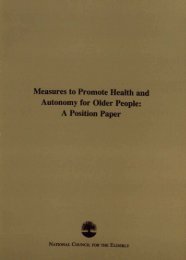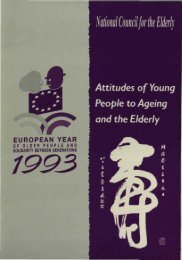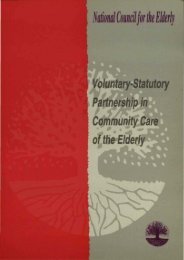From Ageism to Age Equality: Addressing the Challenges ...
From Ageism to Age Equality: Addressing the Challenges ...
From Ageism to Age Equality: Addressing the Challenges ...
Create successful ePaper yourself
Turn your PDF publications into a flip-book with our unique Google optimized e-Paper software.
Provision of Goods, Services, Education and AccommodationIn 2003, approximately one in ten (9 per cent) of <strong>the</strong> case files under <strong>the</strong> Equal Status Acts 2000 <strong>to</strong>2004, which ban discrimination in <strong>the</strong> provision of goods and services, education andaccommodation, related <strong>to</strong> <strong>the</strong> age ground. These involved both older and younger people. Theissues raised included <strong>the</strong> use of age limits <strong>to</strong> exclude older people without any consideration given<strong>to</strong> <strong>the</strong> particular circumstances of <strong>the</strong> person involved. They included claims of discrimination inrelation <strong>to</strong> access <strong>to</strong> insurance provision, licensed premises and public services.In <strong>the</strong> case of Jim Ross, Sun Alliance was found <strong>to</strong> have discriminated against him in refusing <strong>to</strong>provide mo<strong>to</strong>r insurance purely on <strong>the</strong> basis of his age. The company did not quote for new businessfor people aged seventy or over. In ano<strong>the</strong>r case, <strong>the</strong> Q Bar was found <strong>to</strong> have discriminated againsta man aged 72 when it refused him access <strong>to</strong> <strong>the</strong> bar because of his age.Challenging DiscriminationLegislationDiscrimination can be challenged by our equality legislation. As Richard Baker points out in his paper,we lead <strong>the</strong> EU with <strong>the</strong> inclusion of an age ground in <strong>the</strong> Employment <strong>Equality</strong> Acts and EqualStatus Acts. This legislation has contributed <strong>to</strong> positive change in three ways:it provides a means for individuals <strong>to</strong> challenge <strong>the</strong>ir particular experiences of discriminationit serves as a stimulus for employers and service providers <strong>to</strong> have regard <strong>to</strong> equality inproviding employment or services <strong>to</strong> older people64it focuses our attention as a society on ageism and <strong>the</strong> need <strong>to</strong> combat this form ofdiscrimination.AdvocacyLegislation alone, however, is not enough. It is important <strong>to</strong> ensure that <strong>the</strong>re is an effective range ofsupports in place <strong>to</strong> enable older people <strong>to</strong> make full use of <strong>the</strong> protections offered by <strong>the</strong> legislation.The <strong>Equality</strong> Authority has a role <strong>to</strong> play in providing legal advice and representation <strong>to</strong> claimantsunder <strong>the</strong> legislation. Criteria established by <strong>the</strong> <strong>Equality</strong> Authority prioritise cases that have astrategic impact or an effect that goes beyond <strong>the</strong> individual claimant. The <strong>Equality</strong> Authority is notin a position <strong>to</strong> provide legal advice and representation in all cases under <strong>the</strong> legislation. In thiscontext it is important that o<strong>the</strong>r sources of support are available <strong>to</strong> claimants.The trade unions play a valuable advocacy role in relation <strong>to</strong> workplace discrimination. More recently<strong>the</strong> community sec<strong>to</strong>r has begun <strong>to</strong> play a valuable advocacy role in relation <strong>to</strong> discrimination in <strong>the</strong>provision of goods and services. Community advocacy has an important role <strong>to</strong> play in ensuring that<strong>the</strong> equality legislation makes its full contribution <strong>to</strong> challenging ageism.Community advocacy could involve older people’s groups in:providing information, advice and support <strong>to</strong> older people who have experienced discriminationpromoting an awareness of <strong>the</strong> equality legislation, its coverage of older people and successfulcases among local service providers and employersstimulating debate about <strong>the</strong> equality legislation, its importance and how it might be evolved <strong>to</strong>best respond <strong>to</strong> <strong>the</strong> needs of older people.Conference Proceedings















